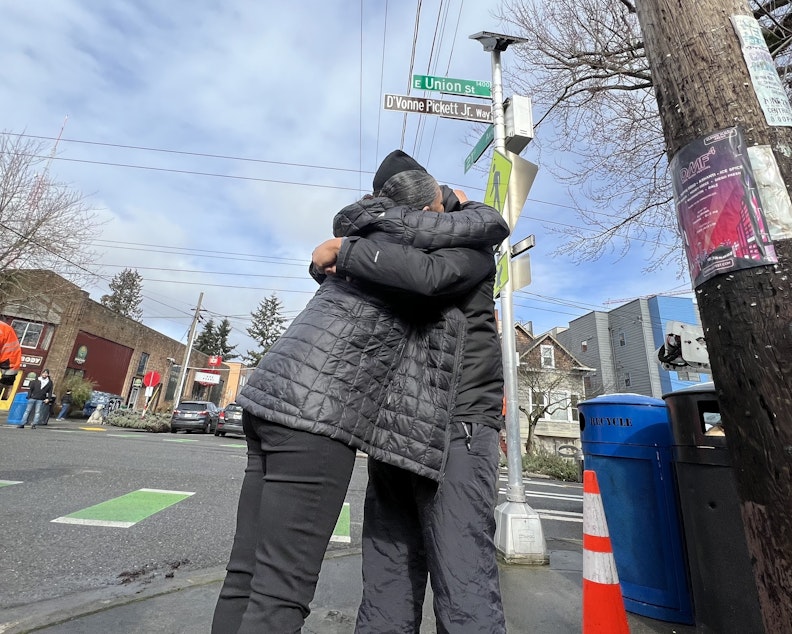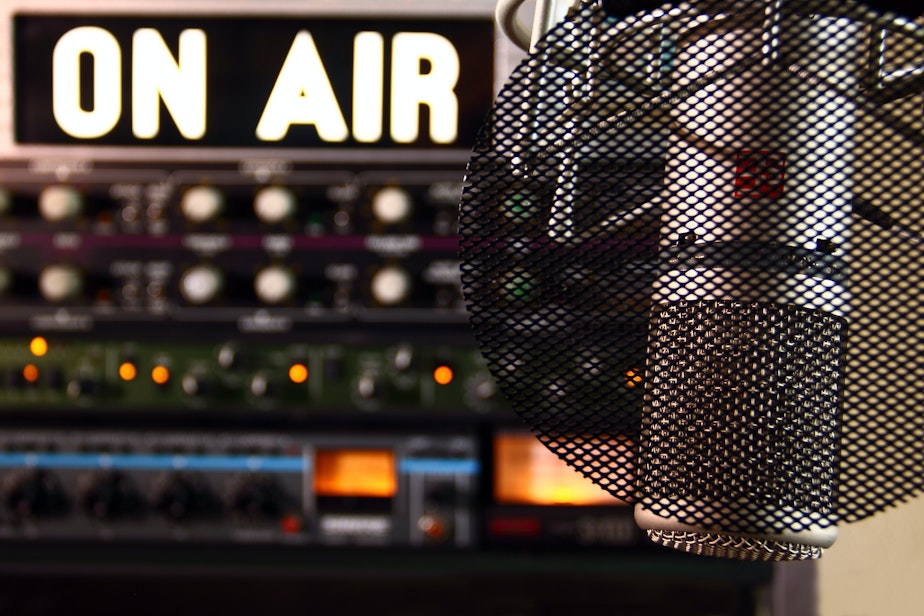What would draw you to live in downtown Seattle?: Today So Far

- What would get you to move to downtown Seattle?
- Mayor Harrell focuses on crime, homelessness, affordability, and more in 2023 State of the City speech.
This post originally appeared in KUOW's Today So Far newsletter for February 23, 2023.
If you don't already, what would get you to live in downtown Seattle?
That's a question KUOW's Joshua McNichols recently put forth in his Downtown Reimagined series. For some folks he spoke with, it was about what the area could offer their family, with kids. For others, safety was the top issue. Different folks have different ideas, but I can tell you the number one thing that would get more people to live in downtown Seattle: affordability.
When I returned to the Seattle area a few years ago, I went apartment hunting (because you can't get a liveaboard spot in this city anymore). I found one spot I could afford, and it was downtown — a small room in a two-bedroom apartment. Upon closer inspection, it turned out that this second bedroom was a former hallway in a remodeled building. The hallway used to be the front entrance to the apartment, but it was upgraded with a loft bed bolted into the walls. That made space for a small closet underneath. An accordion door closed it off. If you laid down to sleep on the loft bed in this room, you could open that accordion door and look directly into the kitchen. I learned, quickly, that's what downtown affordability looks like in Seattle. (I opted not to take the apartment.)
A quick, anecdotal look through Craigslist posts shows that, if you're lucky, you can find a downtown "deal" in the $2,000 range. You're more likely to find rents in excess of $3,000 or $4,000 per month, should you need two bedrooms, because ya know, families are a thing. While you can find better rents outside of downtown, maybe even a unicorn apartment, Seattle generally has an affordability problem. Assessments vary depending on the source, but they all say the same thing: It's expensive around here. One recent assessment states that the cost of living in Seattle is 68% higher than the national average. Another assessment states housing is 114% more expensive than the national average.
Add that up and it's easy to see how Seattle has gotten itself into a few of its modern woes. For many, many years, Seattle has relied on a particular downtown lifestyle — work in downtown, live in Issaquah, and commute. Basically: "Come get some money, leave some of that money, and get the hell out. Where? Don't care, just make sure you leave some of that money before you drive out of town. Also, climate change sucks, so why are you driving so much?"
Sponsored
This leaves a Seattle rental market fit for Frasier Crane, and not so much the barista serving him coffee at Café Nervosa. I doubt any of the "Singles" cast could afford to live in that Capitol Hill apartment anymore (certainly not Cliff). And I hope the Hendersons held on to that Wallingford house, because at this point, they'd have to move in with Harry. Lower the rents, and they will come. Read the full story here.
Such issues were among the topics Seattle Mayor Bruce Harrell focused on in this State of the City address this week.
“Candidly, my direction on our housing levy is simple: We must give the voters of Seattle the ambitious — and achievable — plan that lives up to the scale of the housing crisis and does more than ever to prevent homelessness,” Harrell said in his address.
According to KUOW reporter David Hyde, that translates to, "Building affordable housing is expensive, and the price tag for this one could be big."
Seattle has slated $250 million for affordable housing in its current budget. The mayor also said that it's possible to change zoning codes so that current office spaces could be converted to living spaces. And he indicated that an affordable housing levy could be on an upcoming ballot.
Sponsored
Mayor Harrell also mentioned a few of the main concerns among the people Joshua spoke with while walking through downtown, such as Joseph O'Connell, who lives in Lower Queen Anne.
“You have to be aware of your surroundings. Especially if you're walking around," he said. "I mean, I'm different — African male — people don't tend to mess with me. And I hate to say this, but if I had the misfortune of having a young daughter or something like that, I'd tell her to stay the hell away from downtown if she's by herself, you know what I mean? There's a lot of people on drugs out here. It's kind of crazy.”
Harrell noted that almost 600 people died from overdoses in Seattle last year. He's planning an executive order, expected next month, to address the issue of drugs in the city. He also said the city will arrest and prosecute dealers, and help organizations provide treatment for opioids.
Beyond that, the mayor argued that racism and poverty — which contribute to crime — should be addressed while also building up the police department.
“We're not afraid or intimidated to enforce the law, to make arrests when people cause damage to the fabric of our neighborhoods,” Harrell said.
Sponsored
Check out the full story on this here.
AS SEEN ON KUOW

D'Vonne Pickett Jr. was a community leader and local business owner in Seattle's Central District. He was fatally shot not far from his store in October. This week, Seattle renamed a stretch of Union Avenue after him. (Gustavo Sagrero Álvarez / KUOW)
DID YOU KNOW?
Sponsored
W.E.B. Du Bois was born Feb. 23, 1868. Today is the 155th anniversary of his birth. You could find yourself going down many rabbit holes through history covering Du Bois' life and work. His influence on American culture is extensive, from academia to activist, author, and the first African American to get a Ph.D. from Harvard. Try to wrap your mind around this: He was born shortly after the Civil War and the end of slavery in the United States, and he lived to see the rise of nuclear weapons and TV. That is quite a lifespan (he was even buddies with Albert Einstein).
He was one of the founders of the NAACP and edited its magazine, "The Crisis," from 1910 to 1934. Aside from his work in academia, Du Bois is widely known for his writing. "The Souls of Black Folk" is probably the title you've heard of before. It's his most popular work. But Du Bois wrote a lot ... a lot. From academic books to novels. My favorite piece is "The Comet," which is a sort of sci-fi short story that was tucked into a collection of other writing ("Darkwater"). As such, it doesn't get as much attention, but it should.
Happy Birthday Du Bois!
ALSO ON OUR MINDS

Sponsored
NPR says it's cutting jobs by 10% as ad revenue drops
"When we say we are eliminating filled positions, we are talking about our colleagues — people whose skills, spirit, and talents help make NPR what it is today. This will be a major loss."

